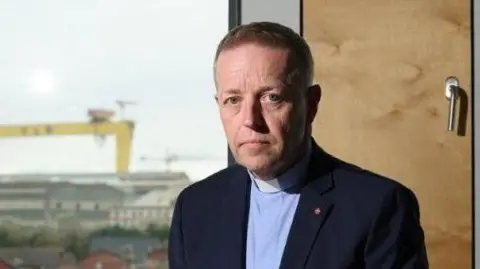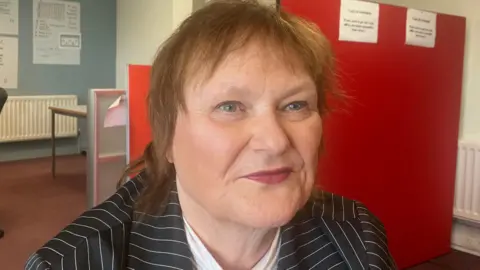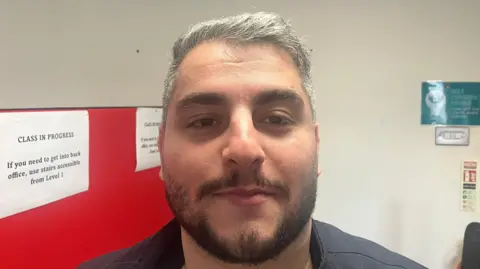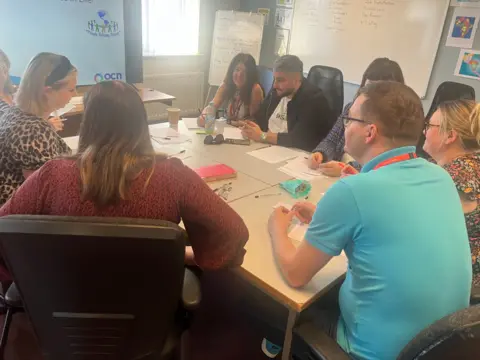Brexit training fund problems leave charities 'struggling'
 East Belfast Mission
East Belfast MissionA number of charities in Northern Ireland have said they face making layoffs due to problems with UK government funding.
They say they now have to find money up front to pay for training work under the Shared Prosperity Fund (UKSPF).
The UKSPF replaced the European Union's European Social Fund (ESF) in March 2023, which came to an end in Northern Ireland as a result of Brexit.
The chief executive of East Belfast Mission, Rev Andrew Irvine, told BBC News NI that charities are "struggling" and the new funding arrangement "beggars belief".
The UKSPF provides funding to organisations in Northern Ireland for "levelling up" their communities and helping people find employment through training.
East Belfast Mission is one of five groups which run the Belfast Works project.
Belfast Works offers free training for jobs including barbering, classroom assistants, fitness instructors, catering, healthcare, and security guards.
But Rev Irvine said that East Belfast Mission is expected to find £180,000 a quarter "out of nowhere" to fund the training and then "wait for the government to pay us".
"If we can't do that then this community - in which 67% of those of working age are currently not in work - lose this service, and East Belfast Mission needs to make 17 people redundant and the partnership needs to make 96 people redundant," he added.
He said that overall Belfast Works had more than 100 staff and worked with 400 people a month to help them get into work.
Eight staff members have already been made redundant, he added.
'Free finance'
The UKSPF website said it would pay delivery organisations "in Northern Ireland in advance, on a six monthly cycle".
But Rev Andrew Irvine said that was not happening and that charities were having to "give the government free finance".
"They're saying we're not going to fund you until the end of each quarter, so for Belfast Works that means five local community organisations trying to finance the government to the tune of a million pounds a quarter," he said.

GEMS Northern Ireland is also part of Belfast Works, and trains people for a range of careers, as well as running classes in English and numeracy.
It's chief executive, Susan Russam, told BBC News NI that they had 18 staff and had helped train thousands of people through the Belfast Works project.
"Our salary bill for Belfast Works Connect, which is due to be paid next week, is just short of £50,000," she said.
"We can find that in April, but we aren't going to be able to find that in May as well.
"I think that's a little bit unconscionable to expect a small charity like ours, who were already working supporting this project and making a real difference to communities and lives, to have to struggle to actually pay our wages."
Cashflow 'challenges'
In a statement, the Ministry of Housing, Communities and Local Government (MHCLG) said it would "work closely with these UKSPF-funded projects to ensure that they continue to receive funding on schedule, so they can keep supporting the most vulnerable in society".
"Our payment schedule remains the same as in previous years," MHCLG added.
However an email from MHCLG, seen by BBC News NI, acknowledged "cashflow for your organisation and partners may present challenges."

Mohammad Alhamwi and Olena Karpenko are among students taking a customer service course at GEMS.
Mohammad, who is originally from Syria, said the course was "really valuable".
"I'm looking to develop myself as much as I can," he said.
"The UK is about having a good career, certificates, lots of skills."

Olena Karpenko came to Northern Ireland from Ukraine, where she was a teacher.
"For me, it's very important - new information, new experience, experienced teachers, supportive people," she said.
"I'm very happy to be here, it's helped me a lot."

Rev Irvine said the situation clashed with the government's aspiration to get people back to work.
"It absolutely flies in the face of the chancellor's position and it actually really, really irritates me when I see the chancellor saying we're going to reduce the welfare payments, but the solution is to get people into work - and then this, this is how they're going about getting people into work?," he said.
"If this idea is to get people out of poverty by getting them into work, then let's fund this properly and stop behaving like this with the delivery partners."
